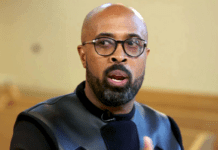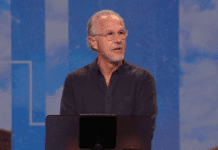Equating homosexuality with pedophilia is strongly contested in the Synodal Path discussions, according to Lücking. “Homosexuality has nothing to do with pedophilia,” she said.
While the majority of Catholics in Western countries agree that homosexuality should be accepted in society, the question of homosexuality and priestly celibacy is more controversial in Eastern Europe, Africa and the Middle East. As the Vatican struggles to adapt church teaching with modern understanding of sex and sexuality, the issue has the power to tear the global church apart.
“This report and the entire sexual abuse scandal, a sad page for the church in Germany, is being exploited to bring about a new church,” said the Rev. Maurice Ashley Agbaw-Ebai, a Catholic priest from Cameroon who teaches theology and philosophy at Boston College.
According to Agbaw-Ebai, who wrote his dissertation on Benedict, the Munich report offered Benedict’s detractors “their pound of flesh” and strengthened the position of those who want to push Catholic doctrine toward the demands of modernity.
Germany’s Synodal Path is the surest sign of that push. On Feb. 5, its plenary assembly approved four documents proposing a “reevaluation of homosexuality” and challenging Catholic doctrine forbidding female ordination and requiring priestly celibacy.
“The synod has changed,” Lücking said, “you can feel the difference at the plenary. There are more and more bishops saying we have to act, we have to change, there is no other way out of the crisis.”
On Feb. 3, the current archbishop of Munich and Freising, Cardinal Reinhard Marx, supported a renewed study on priestly celibacy and told the German daily Sueddeutsche Zeitung, “For some priests, it would be better if they were married.”
Cardinal Jean Claude Hollerich, archbishop of Luxembourg, meanwhile, has proposed that the church’s teaching on homosexuality “is no longer correct.” Hollerich has been named by Pope Francis to oversee the Synod on Synodality, a self-examination of church practices underway in dioceses around the world that will conclude with a summit at the Vatican in 2023.
The concern for Catholic conservatives is that the progressive stance of German prelates will influence Francis’ ambitious reform efforts for the church as a whole.
In Germany “you have a rebellion going on,” Donohue said. “This synod process that is going to go forward is an open invitation for people to exploit any friction in the Catholic Church,” he said, adding that progressive Catholics “will use Benedict as another weapon in their arsenal.”
But Agbaw-Ebai contends that “what is happening in Germany is clearly a result of the actions and statements of today’s Vatican,” pointing to Francis’ willingness to engage with the Catholic LGBTQ community early in his pontificate.











